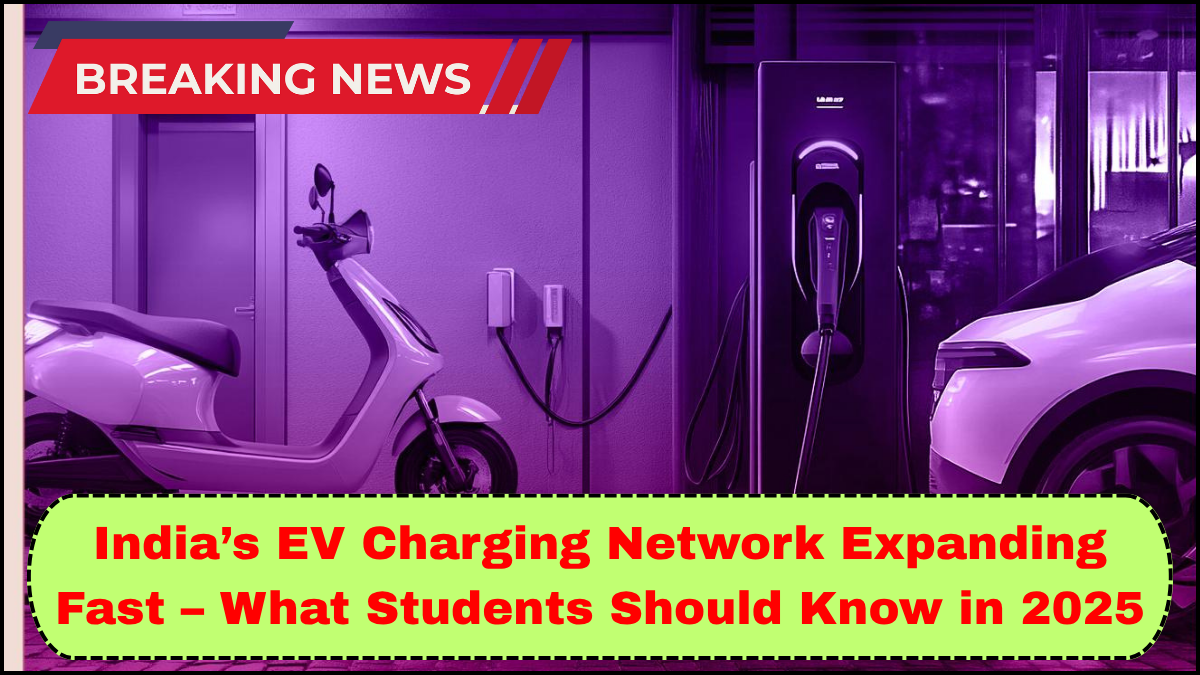India is charging into the future—literally. With climate concerns rising and the global shift towards clean mobility gaining speed, India’s EV charging station expansion in 2025 is not just a policy win; it’s a movement. This transformation isn’t just relevant for policymakers and car manufacturers. Students, especially those involved in school project topics around sustainability and energy awareness, have a lot to learn—and contribute.
Let’s break down why this matters, what’s changing fast, and how students can get involved in this rapidly evolving landscape.

Why the Expansion of EV Charging Infrastructure Matters
Electric vehicles (EVs) are only as effective as the infrastructure that supports them. In 2025, India is expected to see exponential growth in its EV charging network. According to the Ministry of Heavy Industries, over 22,000 charging stations are expected to be operational nationwide by the end of the year, up from just a few thousand in 2022.
This growth is driven by both public and private sector investments. Companies like Tata Power, Ather, and ChargeZone are building fast-charging corridors along highways, urban centers, and even tier-2 cities. The goal? Make EV charging as accessible as fueling up a petrol vehicle.
Key Drivers of India’s EV Charging Station Expansion in 2025
1. Government Incentives and Schemes
India’s Faster Adoption and Manufacturing of Electric Vehicles (FAME) II scheme has been pivotal. It offers subsidies for EV purchases and supports the setup of charging infrastructure. Additionally, states like Maharashtra, Delhi, and Tamil Nadu have launched their own EV policies to speed up deployment.
2. Public-Private Partnerships
Public-private collaborations are taking off. For instance, Indian Oil and NTPC are partnering with startups to install fast-charging units at petrol stations and metro hubs. This hybrid approach ensures high visibility and easy accessibility for users.
3. Technology Improvements
Charging times are dropping fast. With new ultra-fast chargers, a typical EV can get up to 80% charged in under 30 minutes. Wireless and solar-powered chargers are also being tested, pushing innovation forward.
What This Means for Students
The growth of India’s EV infrastructure offers real-world relevance for a variety of school project topics. Whether you’re into science, economics, or environmental studies, the subject opens doors to critical thinking and innovation.
1. STEM Opportunities
Students interested in engineering or tech can study how charging stations work, or even build models using basic components. Topics like “How EV Charging Works” or “Comparing EV Charging Technologies” are great for science fairs or robotics clubs.
2. Environmental Education
This expansion ties directly into energy awareness and climate change education. Projects can explore how EVs reduce air pollution, or calculate the carbon savings from switching to electric mobility.
3. Entrepreneurship Ideas
Young innovators can brainstorm ways to make EV charging more efficient. Could solar-powered micro-stations be the next big thing? What about mobile charging vans for remote areas? The opportunities are endless.
Urban vs. Rural – Bridging the Infrastructure Gap
While metro cities are leading the charge, rural areas are slowly catching up. To achieve inclusive growth, the government is incentivizing EV charging deployment in less-developed zones. Students researching infrastructure development can look into the disparities and propose solutions.
How Students Can Get Involved
-
Join Eco Clubs: Many schools have sustainability clubs that run awareness campaigns on clean energy and mobility.
-
Pitch Ideas in Competitions: National contests like Toycathon or ATL Marathon encourage students to come up with tech-based solutions, including EV infrastructure.
-
Engage with Local Authorities: Volunteering for local EV awareness drives or surveys can build practical understanding and help gather grassroots data.
The Road Ahead: 2025 and Beyond
India’s EV charging station expansion in 2025 is setting the tone for a cleaner, smarter future. With battery technologies improving, range anxiety dropping, and infrastructure going mainstream, it’s the perfect time for students to tune in and tap in.
Energy awareness isn’t just a buzzword—it’s the backbone of tomorrow’s innovation. Whether it’s part of a school project or a lifelong passion, the EV movement offers a dynamic, real-world platform to explore.
FAQs
Q1: What is the current number of EV charging stations in India?
As of 2025, India has over 22,000 public EV charging stations, with hundreds more being added monthly.
Q2: How can students benefit from learning about EV infrastructure?
It opens up opportunities in science projects, helps develop tech skills, and builds awareness around sustainable energy solutions.
Q3: Are there any government programs supporting EV education?
Yes, initiatives like FAME II and state EV policies include education components and encourage innovation from students through competitions and workshops.
Q4: What are some good school project topics related to EVs?
-
How EV Charging Stations Work
-
Solar Power for EV Infrastructure
-
Urban vs. Rural EV Charging Challenges
-
Carbon Emissions Comparison: EVs vs ICE Vehicles
Q5: What skills do students need to get involved in EV-related fields?
A basic understanding of electricity, environmental science, coding, and problem-solving are key. Soft skills like creativity and collaboration are also valuable.
click here to learn more